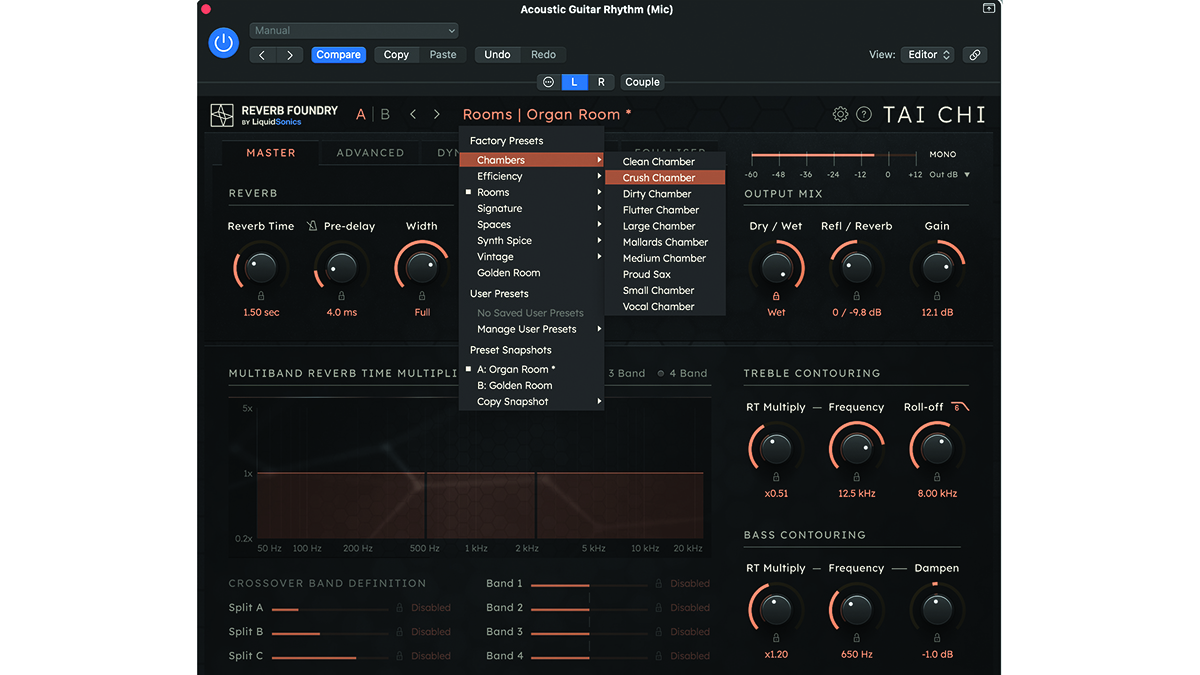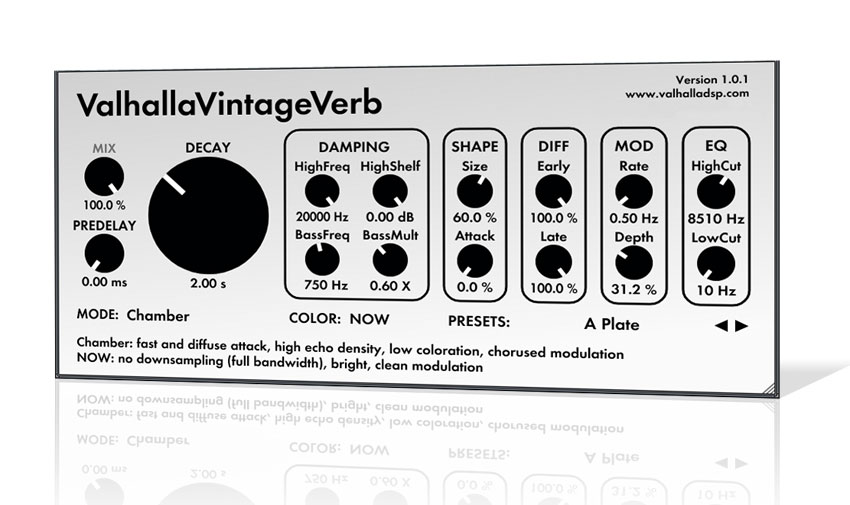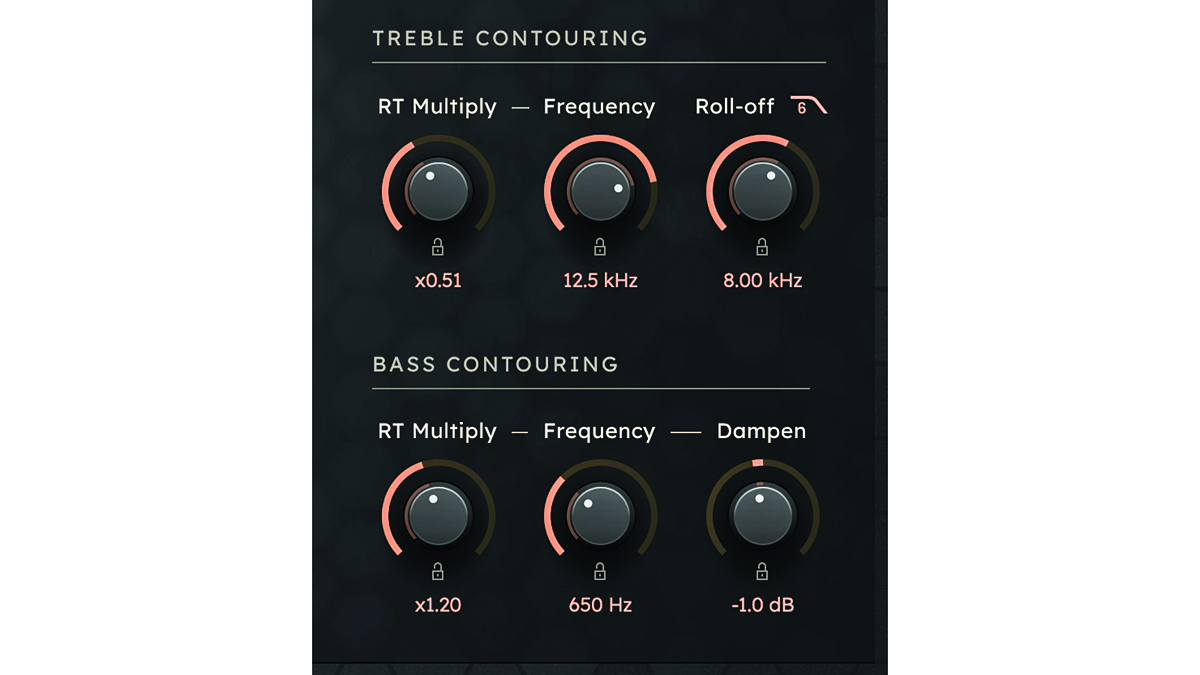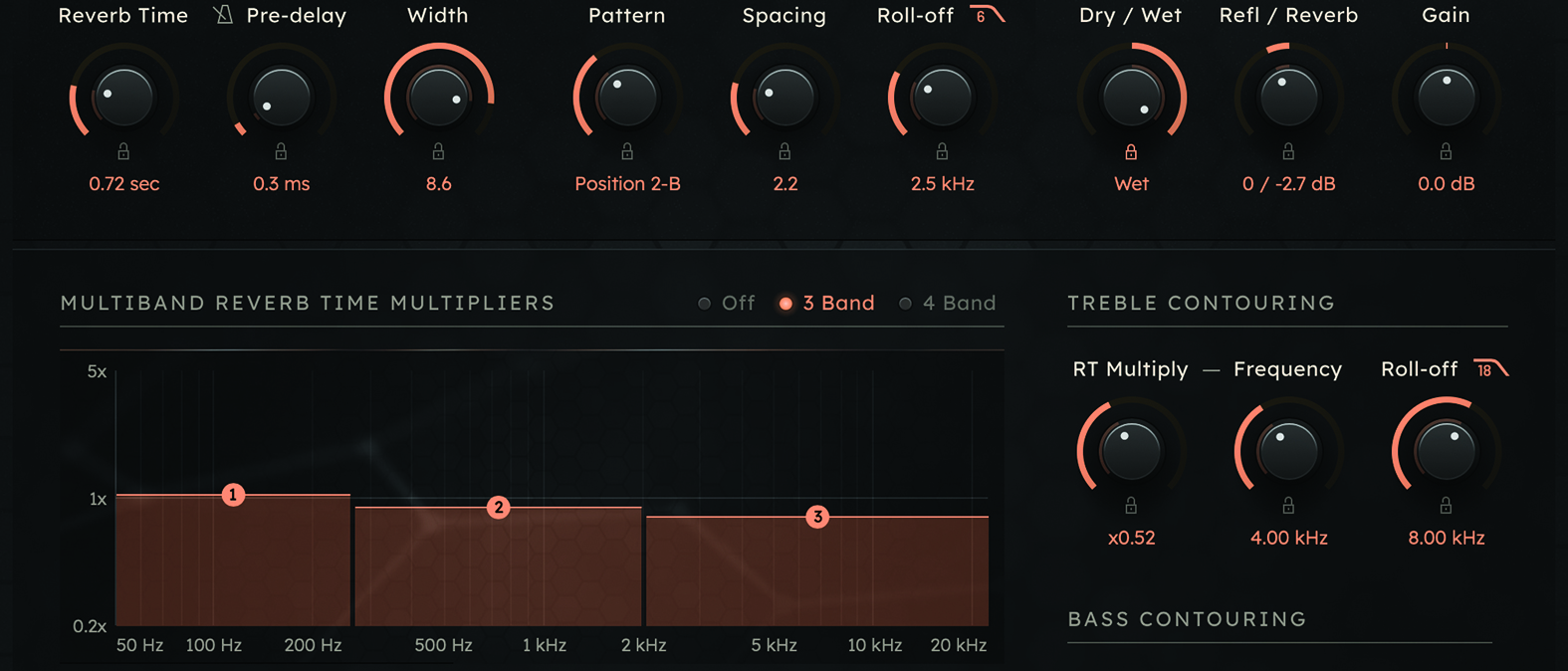MusicRadar Verdict
For dense ensemble reverb-crafting, virtual space modelling and much more, Tai Chi provides a ton of control, and will also prove an indispensable sound design and stereo mixing tool.
Pros
- +
Lush ensemble reverb potential.
- +
Room shaping scope is very wide.
- +
Surgical multiband editing ability.
- +
Hybrid reverb engine limitless in scope.
Cons
- -
A little on the pricey side.
MusicRadar's got your back
LiquidSonics/Reverb Foundry Tai Chi: What is it?
Just what is it about the sound of a space that make human beings feel a certain way? It’s a tricky question to answer, but it’s a fact that the character of an instrument, a voice or the overall mix of a record can be enhanced by placing it within a particular environment. Perhaps it’s just psychology, or perhaps it’s down to how frequencies interact, resonate and bolster themselves in particular spaces via structural dynamics.
Spatial effects like reverb, echo, delay and chorus are important components of mixing. It’s an avenue that Reverb Foundry (brainchild of plugin developer Matthew Hill, the man behind Cinematic Rooms and Seventh Heaven) intends to map out via a fine-honed plugin series, the latest of which we’re getting to grips with here.
Incorporating both convolution and algorithmic approaches, the flexible Tai Chi intends to bridge the gap between room reverb, sonic expansion and more cinema-aimed sound design via its extraordinary level of control. At heart, Tai Chi is a pulsing ensemble reverb plugin, giving the means to amass spaces coated in chorus, and bringing fatter, multi-voiced sounds to your mix.

LiquidSonics/Reverb Foundry Tai Chi: Performance and verdict
The third release in the Reverb Foundry canon, Tai Chi is navigable via a straightforward UI, with the most useful parameter controls immediately visible.

• Valhalla DSP Vintage Verb
Room design with a retro-character is what Vintage Verb is all about.
• MeldaProduction MChorusB
For more forensic on chorus-craft, Melda’s space and width-enhancing plugin is a reliable go-to.
The plugin’s five main control views run along the top, consisting of Master, Advanced, Dynamics, Fidelity and Equaliser tabs. Within each, appropriate rotaries and graphs are accessible which grant detailed fine-tuning of your space. In the Reflections area of the Master tab, you can select a space type, from Room, Hall, Church, Garage and Stadium, as starting point. From there, the shaping of their surface space, reflection quantity and overall dry/wet balance is entirely down to you. Playing around with the Spacing and Roll-Off controls, we discover the ability to ostensibly stretch and carve these spaces to taste.
While standard Time, Width, Pre-Delay and Output Mix controls are present and correct, its down on the bottom left of the UI where Tai Chi’s true powers begin to show themselves. Within the Multiband Reverb Time Multiplier, we’re able to set individual timings to four bands of decay. This allows us the ability to create lush ensemble reverbs that tantalisingly move and morph, something that will surely be of interest to the sound design inclined. The Wet/Dry controls coupled with the frequency contouring abilities, provide even deeper routes to filtering your high end and fattening out your low.

Lock In
Something we found extremely useful when jumping between Tai Chi’s (superb) features, is the Parameter Lock option. This keeps your favoured parameter settings locked in place while more global changes can be applied. Displayed with a simple padlock, pretty much any of Tai Chi’s numerous settings can be secured.
Want all the hottest music and gear news, reviews, deals, features and more, direct to your inbox? Sign up here.
You should consider doing this before setting about exploring the huge array of factory presets on offer (75), or by delving too deeply into the Advanced Tab, where you can affect key space simulation aspects such as Density, Spread and Diffusion. All of these locked presets can be reset with just one click.
Make some space
The shining beauty of Tai Chi lies in these lustrous chorused ensembles, bestowing the ability to fatten up guitar and synth sounds yet without the occasionally jarring pitch oscillations that can create dissonance (or you can still have that, if you so need).
Its shining beauty lies in these lustrous chorused ensembles, fattening sounds without dissonance
Combining the modulated all-pass filter approach that typically yields Concert Hall emulation with the multiband processing of classic TC Electronic reverbs, Tai Chi uses a blended algorithm to fuel this surround-ready modern reverb plugin.
While Tai Chi is an effective space-generator, it’s also adept at being a compressor. Its ability to duck its reflection engine and boost certain vocal (or instrumental) elements is a godsend for carving your reverb around your track, accentuating key hooks. And, there’s still more yet to discover. Tai Chi provides seemingly limitless spatial control, ensemble generation and all manner of twisting and warping abilities. From our initial tests, it’s abundantly clear that Tai Chi is a richly rewarding route to making some space.
MusicRadar verdict: For dense ensemble reverb-crafting, virtual space modelling and much more, Tai Chi provides a ton of control, and will also prove an indispensable sound design and stereo mixing tool.
LiquidSonics/Reverb Foundry Tai Chi: The web says
"Brilliant ideas and products like this don’t come around that often, and I think Tai Chi should be standard kit in any plug-in folder and/or session template. Highly recommended!"
MIX
LiquidSonics/Reverb Foundry Tai Chi: Hands-on demos
LiquidSonics
Matty Harris
Production Expert
LiquidSonics/Reverb Foundry Tai Chi: Specifications
- Windows PCs running Windows 7 or above.
- Macs running macOS 10.9 (Mavericks) or above.
- Intel/AMD x64 or Apple Silicon processors (native and Rosetta).
- Recommend system specifications: AMD Zen 3 or higher (e.g. 5000 series and up). Intel 10th or 11th gen or higher (e.g. 10xxx, 11xxx series and up). 6 cores minimum (8+ recommended).
- CONTACT: LiquidSonics/Reverb Foundry
Computer Music magazine is the world’s best selling publication dedicated solely to making great music with your Mac or PC computer. Each issue it brings its lucky readers the best in cutting-edge tutorials, need-to-know, expert software reviews and even all the tools you actually need to make great music today, courtesy of our legendary CM Plugin Suite.

